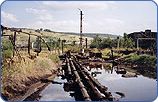|
People, cities, industry, agriculture, all kinds of activities in all 18 countries, be it by the Danube River's own banks or near one of its many tributaries, impact the natural environment of the basin and the Black Sea into which the Danube flows. This includes the quality of drinking water on which tens of millions of people depend every day. POLLUTION |
 |
Pollution remains a serious problem. The volume of nutrients - mainly from agricultural fertilizers, household products and urban sewage - entering the river is too high - one of the main reasons why the Black Sea is seriously at risk. Toxic substances are also a key threat - made worse by mining accidents or floods that spill or flush toxins directly into watercourses. Most recently, the August 2002 floods that raged through Central Europe and the Danube basin were in part the result of past decisions that led to deforestation and the destruction of natural floodplains in the Danube (as well as because of human-induced global warming). WETLAND DEGRADATION |
 |
Preserving habitat for the rich and diverse natural species living in the basin is also a constant struggle. Some 80% of the Danube's wetlands and floodplains have been lost since the end of the 19th century, threatening the habitat of pelicans in the Danube Delta, sturgeon in the Lower Danube, beavers in the Upper Danube and countless other species. |






